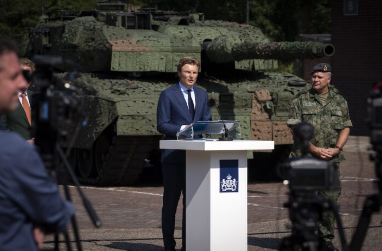The Dutch government is pumping an additional €2.4 billion into spending on defence, including “hefty” investments in recruiting personnel.
“The best way to prevent war is to keep your opponents at a distance,” defence minister Ruben Brekelmans said at the presentation of the new plans. “And that requires a credible, strong and innovative military.”
Russia’s aggression in Ukraine shows that an attack on a Nato member is no longer unthinkable, he said. “That would have far-reaching consequences for Dutch security and prosperity. So we and our allies have to do the maximum to prevent this happening.”
On Wednesday, RTL reported that the ministry was planning to buy additional F35 fighter jets, and earlier it was reported that the Netherlands is to get its own tank battalion, with some 50 tanks.
The new investment will also go on frigates to combat submarines and fighter helicopters. Spending on personnel will rise by €260 million, including efforts to recruit more manpower.
“We can buy more equipment but without the right people, tanks cannot drive, F35s won’t be airborne and frigates will not leave the dock, “ said junior minister Gijs Tuinman, a former professional soldier.
According to broadcaster NOS, while old-style military service won’t be brought back, officials are looking for a form of service which would “pave the way for measures of a (gradually) more compulsory nature”.
Active military service was abolished in the Netherlands in 1997 although all boys and, since 2019, girls are sent a letter in the year they turn 17 informing them they have been added to the military service register.
They can be called up at any time if the Netherlands goes to war with another country before they turn 45.
Service year
Last month it emerged that the majority of youngsters taking part in a “voluntary service year” with the armed forces have decided to stay on.
In total, 102 school leavers who spent time with the military as part of an experiment to increase the number of recruits have opted to join up in some form, the ministry told broadcaster NOS.
The second year of the project starts in September and the minister expects between 500 and 600 people to take part. In total, 3,000 applied for a place.

